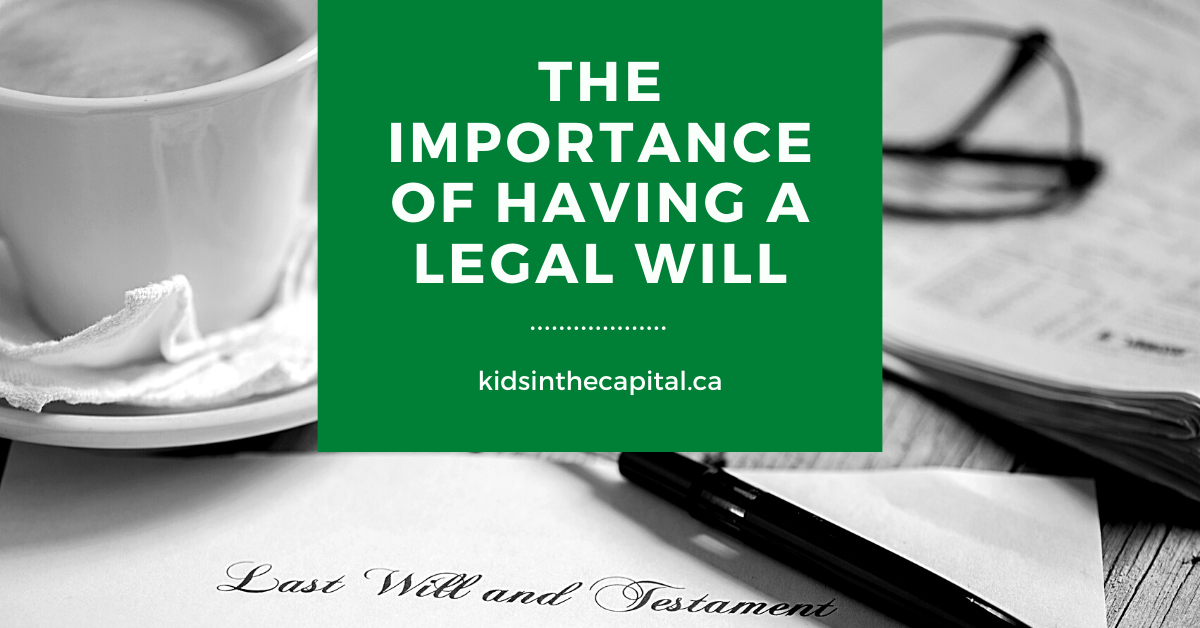Why it’s important to have a Will
Having a Will provides certainty. When you pass away, you want certainty of knowing how your estate is going to be distributed; who’s in charge of your estate and also, depending on your current life situation, that your kids, other assets, funeral arrangements, and religious beliefs are addressed in accordance to what you want and believe in.
If you die without a Will, the law says that you have died “intestate,” which means that you left no instructions as to how your property is to be divided and distributed and so a provincial act will govern how your property will be distributed to your surviving relatives. If you are married, this will probably mean a spouse gets everything. If a spouse and kids are left behind then your estate would generally be divided between them. Most people are okay with that, but you may still want specific arrangements for say a godchild or special needs sibling, etc. Having a Will makes sure you’re taking care of all those people the best way you can – with certainty.
What happens if parents die and children are left behind – and there’s no Will?
When one parent dies and the parents are married or separated, the surviving child(ren) go to the surviving parent, unless there is just cause as to why this should not happen. If both parents die and kids are left without a Will stating who they will live with, then it is considered a live issue. A Will can assign a person(s) to be guardian(s) of children as well as assign a guardian of their property. A Will makes it certain of who is responsible otherwise it is up to the state to figure that out and that can be messy and put children in what is already an awful situation.
When deciding on who children should live with and who should manage their property, make sure you discuss it with your spouse. As well, make sure whoever is assigned to manage the property for the children is someone you trust. Deciding this and putting it into a Will offers peace of mind for all involved parties.
How often should I review my will?
Vinayak recommends having a Will reviewed every two to three years, but other events can also trigger a Will to be void or warrant a change. For example, if you have a Will made before a marriage and then get married – your Will becomes void. Your Will should also be reviewed with every child. As well, a Will should be altered upon a separation or divorce. Unlike when you get married, a Will is not void upon separation or divorce. You always want to make sure your Will reflects your current wishes.
As well, if you are in a common-law relationship it is a good idea to have a Will if you want your common-law partner to inherit part of your assets, otherwise, they will likely get nothing – similar to how family law works.
How easy is it to change a Will?
Changing a Will is pretty straightforward. Depending on the changes sometimes a draft document with amendments (a codicil) can be made and other times the entire Will is redone to avoid multiple documents.
Do I need to see the same lawyer who first drafted the Will when I need changes?
No, you can take your Will to any lawyer, but it may be easier to use the same lawyer since they will have the original on file. It may also cost less.
What are the benefits of having a Will made using a lawyer versus a Will kit?
Making a Will without using a lawyer will cost you far more in the long run. Most people who make a Will themselves do it wrong. Lawyers go to law school for a reason – they know the law! And lawyers also add an extra layer of protection in terms of legal capacity.
Wills are often challenged on a person’s capacity to make the choices they made, especially if someone doesn’t like something you did in your will. If a lawyer drafts the Will then there are multiple layers of protection to prove capacity, including an intake sheet, the lawyer asking the person to set out assets, and typically within the initial phone call, a lawyer can make sure a person has the capacity to assign assets, assign the powers of attorney, etc.
If a Will made with a lawyer is ever challenged, a lawyer will have notes to help in establishing your capacity. Remember, a lawyer should have no vested interest in your estate compared to a friend or family member who would.
If you do your Will wrong and your Will is not enforceable in that people can’t do anything with it, then all that effort is for nothing. If it causes more problems than it solves, you are leaving the mess of dealing with your assets and debts, and possibly your children, up to your surviving family to wade through.
You need someone objective to give you honest answers and challenge assumptions – a lawyer can do that!
What is a Power of Attorney and why is having one important?
There are two types of Power of Attorney:
For personal care – i.e., helps make health care decisions should you be incapable of making the decisions yourself i.e., you are in a coma. This person would take over and make decisions for you.
For property – to manage your assets. Again, if you were incapable, someone with Power of Attorney for Property will manage finances, pay your bills, etc.
Your Power of Attorney has significant power. Make sure you choose someone you trust and knows your wishes, such as a close family member. You want to select someone you know will follow your wishes, and not abuse their power – no matter what.
If you do not have a Power of Attorney for Personal Care then the decisions can be made by certain family members listed in a provincial act called the Health Care Consent Act. In some cases, a provincial body called the Office of the Public Guardian and Trustee can become involved to deal with your personal care decisions and to manage your finances. This process can be far more frustrating and less predictable for you and your family members.
When you have a legal Will made, you can also ask your lawyer to prepare Powers of Attorney in separate documents as a part of your estate planning.
Creating a Will can be difficult, but Vinayak’s personable, friendly and ability to explain legal terms in a way I could understand gave me reassurance that having a Legal Will is not only important, but it’s also necessary!
If you want to learn more or are ready to get a Will, contact Vinayak. He’s currently offering virtual appointments and is available by phone 613-627-4800 or email vinayak@freshlegal.ca
















